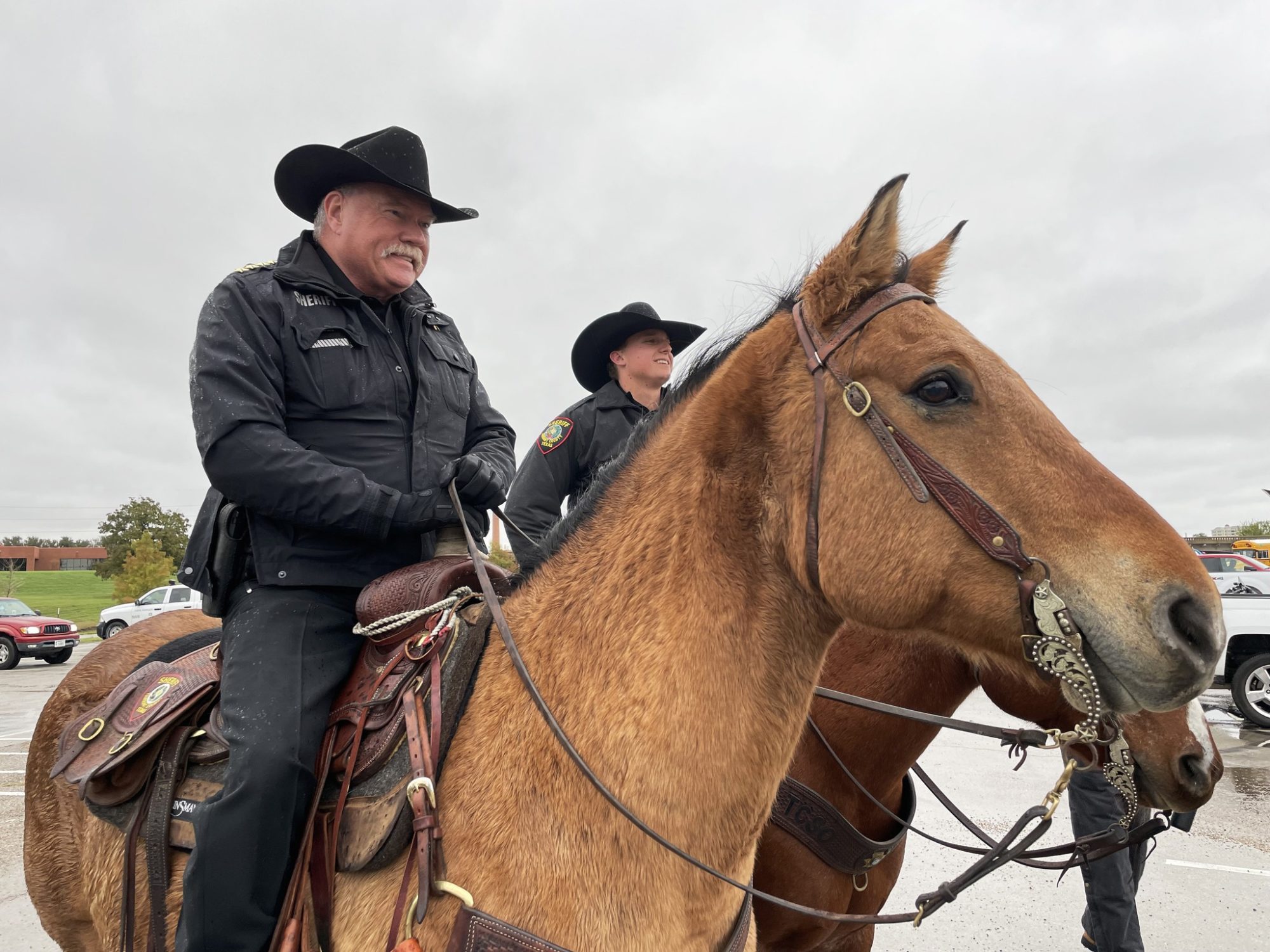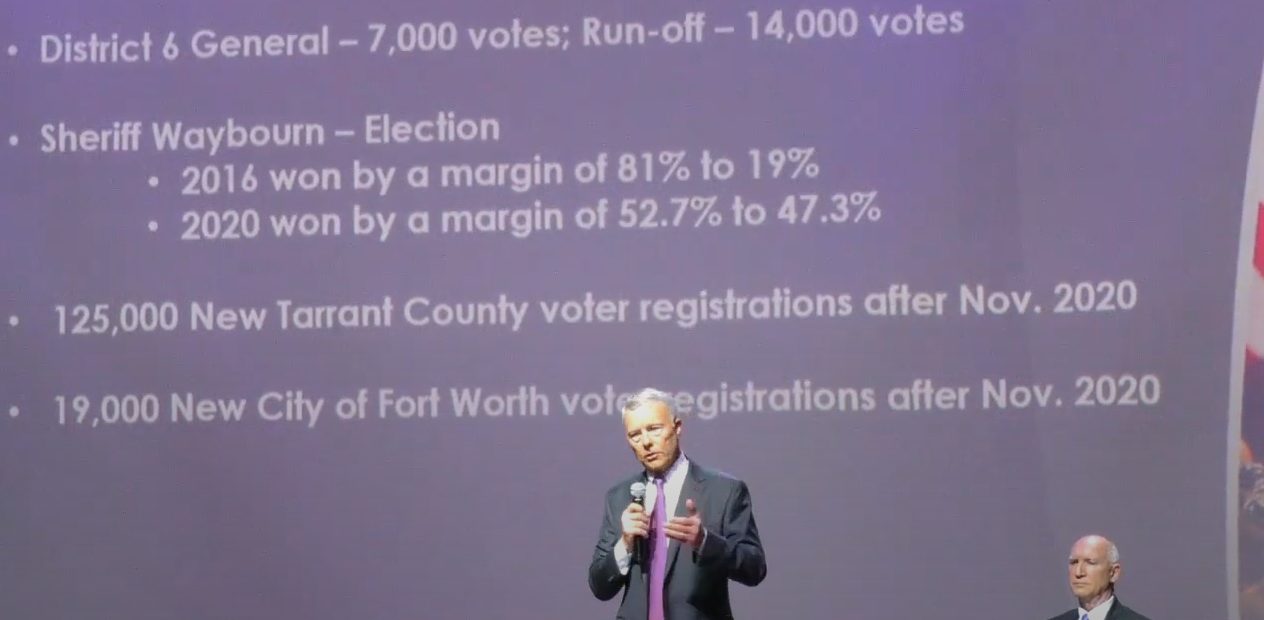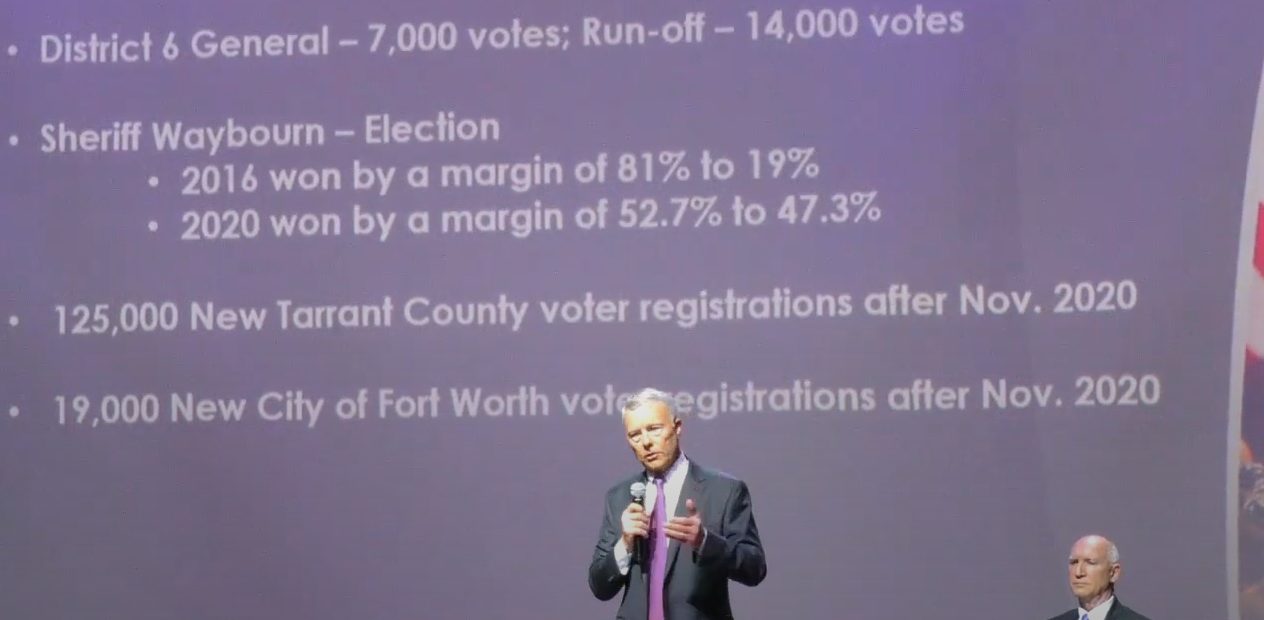Right-Wing Task Force Will Police Elections in the Texas GOP’s Last Urban Stronghold
Tarrant County Republicans are ramping up investigations, despite the local elections administrator being widely lauded for running smooth and secure elections.
Jessica Pishko | March 9, 2023


As Tarrant County’s Republican Sheriff Bill Waybourn explained his plan to increase the policing of local elections, he tried to reassure anyone worried about his fealty to former President Donald Trump or alarmed by the election-denying wing of his party.
“I’m not a conspiracy [theorist]. I believe that Lee Harvey Oswald killed the president, and I believe Joe Biden is the president—I believe all that,” the famously right-wing sheriff told county commissioners at their Feb. 21 meeting. “But I do know that there are people who are concerned, and they have a concern, and it’s a legitimate concern.”
Waybourn launched the new Election Integrity Task Force “to investigate and prosecute individuals perpetrating voter fraud within Tarrant County” last month in coordination with newly-elected District Attorney Phil Sorrells and Tarrant County Judge Tim O’Hare, both of whom promised to ratchet up policing of elections when campaigning with Trump’s endorsement last year. In his presentation to county commissioners, Waybourn said the task force, which will solicit and investigate complaints about elections, would be staffed with existing county employees, including two sheriff’s investigators, two DA’s investigators and one prosecutor.
“The whole idea of the DA and sheriff standing together, I think it’s a very important message to the community, and I think it’s a very important message that we’re centralizing that,” the sheriff told commissioners. “I think it’s a very important message that this is being handled by professional investigators and professional prosecutors.”
Roy Brooks, one of the two Democrats on the five-member commission, told Waybourn “there is no demonstrable issue with election integrity in Tarrant County.” Brooks spoke slowly but sternly as he told the sheriff, “I am concerned that we are enshrining in our current county infrastructure the ability to deny the results of any election that the three of you (Waybourn, Sorrells, and O’Hare) take exception to.”
When Brooks called the task force a “conspiracy” to undermine election results that local conservatives don’t like, he drew audible gasps and jeers from the more than a dozen people in the crowd who had signed up to testify in support of the sheriff’s idea.
The meeting followed years of conservative activists in North Texas spreading baseless conspiracies about widespread voter fraud. As Bolts reported last year, Republican lies about the 2020 election have emboldened conservative activists in Tarrant County, a county of more than 2 million people that’s home to Fort Worth and the last urban Republican stronghold in Texas, to further question local election results and political trends that reflect the increasing left-leaning population of the county. (The county voted for Joe Biden in 2020 by a bare majority.)
These conspiracies continue to rage despite Tarrant County’s election administrators being widely lauded for running smooth and secure elections. A state audit of the county’s 2020 general election concluded that elections staff delivered a “quality, transparent election,” while the former Republican-appointed secretary of state (someone who briefly aided in Trump’s attempt to overturn the 2020 election) recently praised Tarrant County Elections Administrator Heider Garcia as the “prototype for an election administrator.”
Garcia, who was appointed in 2018 by a bipartisan county election commission, gave the public a lengthy presentation during a county commission meeting last spring, walking people through each step of the voting and counting processes while explaining the various systems for ensuring ballot security. He even threw a mock election ahead of last year’s midterms to try and build confidence in the voting systems.
That did not satisfy Garcia’s conspiracy-minded critics. Last year, Garcia testified in a letter to the U.S. Senate Judiciary Committee about the torrent of racist messages and death threats he’s received since the 2020 election. “To this day,” Garcia wrote, “not a single person or entity has been held accountable for the impact this whole situation had on my family and myself.”
When announcing the Tarrant County election integrity task force last month, the GOP officials who launched it confirmed to reporters that they hadn’t consulted with Garcia, who was also notably absent from the meeting where the sheriff presented the plan to county commissioners. The commissioners were also not informed of the move before the press conference.
Kat Cano, a Democratic appointee to Tarrant County’s early voting ballot board, which processes early votes, urged Waybourn and other officials to consult with election workers if they want to improve voting. Cano called for better training and pay for elections staff over more policing, and told commissioners that both parties lost election workers last year, in part due to the onslaught of harassment against them by election deniers.
“This is an election complaint task force, not an election fraud task force,” Cano told Bolts when reached after the meeting.
Waybourn’s new election task force fits into a broader attempt by conservatives to police elections since Trump’s 2020 loss and Republican lies about widespread fraud. In recent years, state legislatures across the country have proposed dozens of laws to increase criminal penalties for people who, even unintentionally, cast an improper vote. An investigation by Reveal found that 14 states last year tried to implement laws that would enable law enforcement to pursue voting crimes more aggressively.
This year, Texas Republicans have proposed a bill that would allow Attorney General Ken Paxton, who aided in legal efforts to overturn the 2020 presidential race, to ask prosecutors from neighboring counties to pursue election fraud cases if the county district attorney refuses. Another proposed law would allow Paxton to remove prosecutors from office for refusing to pursue certain cases, which could apply to election-related cases that he wants to see prosecuted. Republicans have also proposed bills that would increase voting violations to a felony, punishable by up to 10 years in prison and a $10,000 fine.
Some red states and counties have also started creating specialized law enforcement groups with the express goal of seeking out and punishing improper voters. Florida Governor Ron DeSantis has created perhaps the most infamous version, sending out armed law enforcement to arrest almost two dozen people, many of whom were told by public officials that they were eligible to vote.
In other states, elected county sheriffs have picked up the baton, using their politicized position to advocate for additional scrutiny of voters. In Kansas, a sheriff claimed to be investigating multiple cases of voter fraud, but could not produce public records about them. A Wisconsin sheriff conducted an intrusive investigation into voters at nursing homes, but the prosecutor refused to pursue the case.
Waybourn hasn’t been specific about whatever complaints prompted him to create the new task force in Tarrant County. When pressed by Democratic commissioners, who questioned the need for it, Waybourn offered only sparse details, saying his investigators are currently “looking at 11 cases,” while also stating that they’ve been sifting through “a package of emails and probably 60 or so phone calls, or 70 phone calls.” It’s unclear how many of the tips Waybourn has received so far even alleged actual voter fraud; Waybourn, for instance, characterized some complaints as, “somebody felt like they were intimidated or something to that effect.”
(The sheriff’s office did not respond to a request for comment.)
Democratic commission member Alisa Simmons, the longtime president of the local NAACP chapter who was elected last year, told Waybourn that many of the complaints he described should be referred to elections officials rather than law enforcement after the sheriff offered up an example of someone complaining after arriving at a polling place and being told they weren’t registered.
“This is just political posturing,” Simmons told Bolts. “The reason I’m opposed to this unit is because Tarrant County already investigates claims. We already have an elections administration, with 43 staff members, whose jobs include investigating claims of fraud or prohibiting further fraud, educating others, answering their questions, and therefore, there is not a need for the creation of a voter fraud task force.”
While Waybourn has become a sort of right-wing media star since his 2018 election, his critics have accused him of failing at the more core duties of his job, pointing to the spike in deaths at the Tarrant County jail on Waybourn’s watch. Pamela Young, a local activist who has protested the sheriff and called for his ouster over the multiple allegations of brutality and medical neglect inside the lockup he oversees, called his new election crimes task force “a circus they are putting on as red meat to their base.”
“This was expected and orchestrated,” Young told Bolts. “These people have been plotting for years on how to keep Tarrant County red.”
O’Hare vowed to create a new “election integrity officer” to do the job of the task force when he ran for Tarrant County’s executive last year, but last month said he settled for the sheriff and DA’s plan because it wouldn’t create any added costs to the county. O’Hare was formerly a city council member in Farmer’s Branch, where he spearheaded ordinances to make English the official language and to require apartments to check the immigration status of renters. He also founded Southlake Families PAC, which funds candidates for local school boards who ran on platforms that supported “Christian values” and opposed efforts at diversity and social justice.
Tarrant County has a history of harsh prosecutions for voter fraud that have drawn pushback from voting rights advocates. Crystal Mason was sentenced to five years of prison for casting a provisional ballot in the 2016 election, which was never counted, while she was still on probation; she is currently appealing her conviction for the second time. Another woman was sentenced to eight years in prison for voting with a green card. In both cases, the women said that they did not realize that they were not permitted to vote. By contrast, a judge was given probation for forging signatures to make the 2018 primary ballot.
During the meeting last month, many of the concerned citizens who testified in support of the task force asserted that, despite all the evidence to the contrary, local elections were hopelessly corrupted. Some sounded the alarm over the creeping threat of communism and socialism while others called for the elimination of all electronic voting equipment.
“I’ve seen plenty of surveillance camera footage of all kinds of questionable things happening all over the country,” one woman said, seeming to address Brooks and Simmons, the skeptics on the commission. “And to say that ‘oh, I don’t have a leg to stand on’ is really unfair to me.”
Sign up and stay up-to-date
Support us
Bolts is a non-profit newsroom that relies on donations, and it takes resources to produce this work. If you appreciate our value, become a monthly donor or make a contribution.








